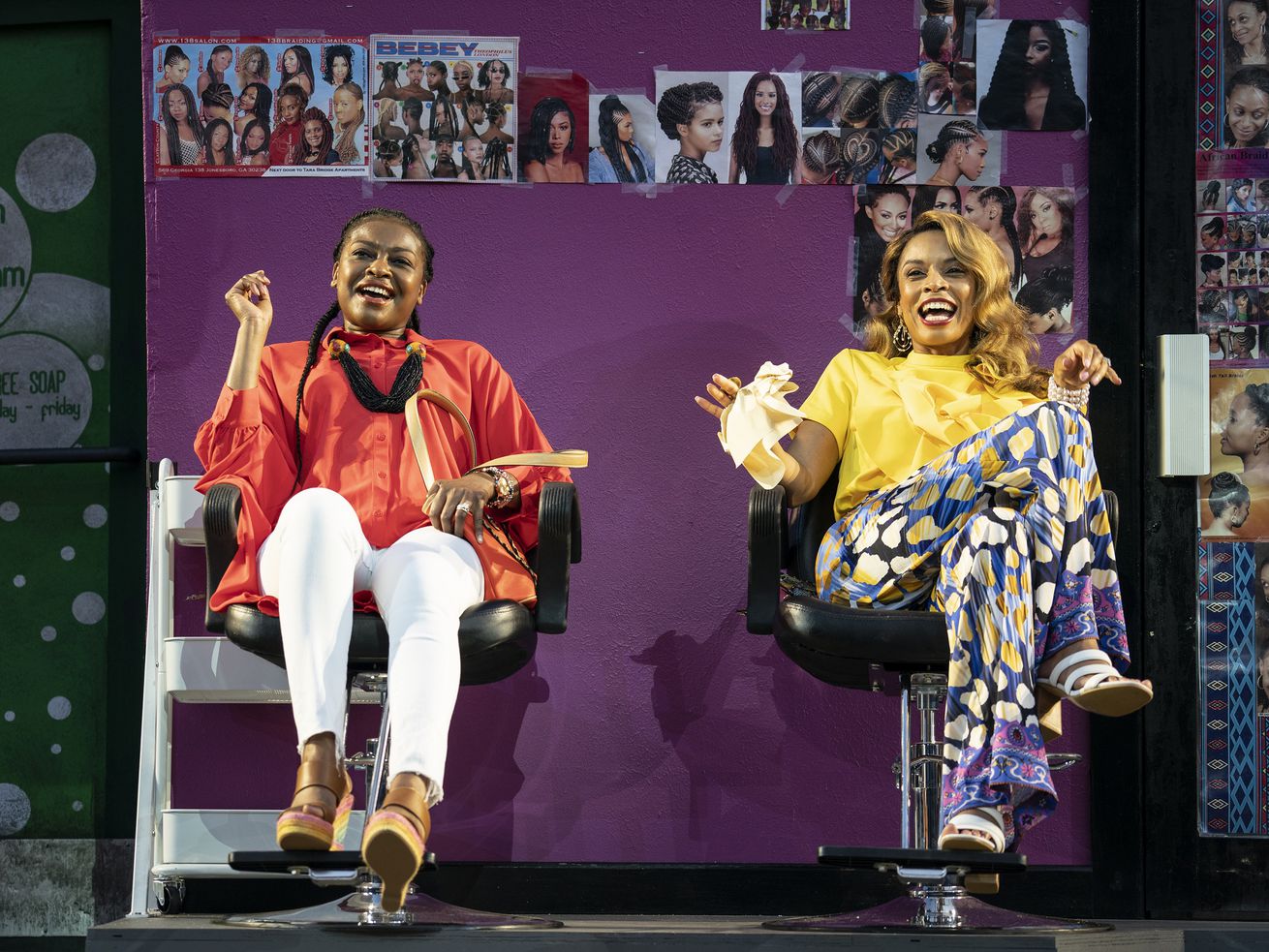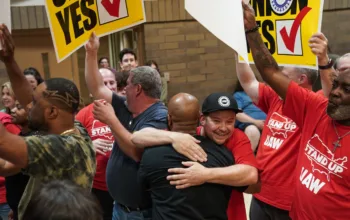The Public’s all-Black staging of Merry Wives is a giddy triumph.
Live theater is making its cautious return to New York City. Broadway is still keeping one eye on plans for a September opening and another on delta’s rising transmission rates, but the smaller theaters are carefully, warily beginning to crack open their doors. At one of them — Central Park’s iconic open-air Delacorte Theater — Shakespeare in the Park has flung its arms wide for Saheem Ali’s exuberant new all-Black production of Merry Wives.
“A celebration of Black joy and vitality,” reads one side of the playbill. “Welcome back New York,” reads the other.
Last summer, the Delacorte went dark for the first time in its 67-year history. This summer, its new production has some strictures. The show runs for just 110 minutes, so as to avoid an intermission and the attendant mingling. There are only 12 actors in the company, so that no one has to share a dressing room. Audience members are only allowed to doff their masks if they’ve shown proof of vaccination and are seated in the immunized section, while attendees in the unvaccinated sections are seated in socially distanced pods and required to mask themselves when not eating or drinking.
Even with all these precautions, the show has had to cancel multiple performances after a company member was diagnosed with Covid-19.
But inside the Delacorte, the mood is giddy. Live theater is back at last, and the atmosphere is electric with relief.
Elegantly adapted from Shakespeare’s Merry Wives of Windsor by Jocelyn Bioh, Merry Wives tells the story of the exploits of John Falstaff, id-driven drunk and one of Shakespeare’s greatest comic creations, and the women in whom he meets his match. Falstaff plans to seduce two of his neighbors’ wives and steal their husbands’ money — but the women manage to flip the script on both Falstaff and their jealous spouses, with much, well, merriment.
Shakespeare’s Merry Wives of Windsor is widely considered one of the Bard’s lesser comedies. Shakespeare invented Falstaff to be Prince Hal’s drinking buddy in Henry IV, Parts 1 and 2, and legend has it that he spun off Falstaff into Merry Wives of Windsor at Queen Elizabeth’s special request. (“I should like to see Falstaff in love,” Elizabeth says in the apocryphal story.) In any case, Shakespeare’s Merry Wives has the hallmarks of a play written very quickly: Falstaff’s jokes aren’t as funny or as complex as they were in the Henry plays, and there’s a sour and close-minded xenophobia underlying much of the humor.
But Bioh and Ali’s adaptation preserves the broad slapstick comedy of Shakespeare’s original — and the unusually rich roles it offers multiple actresses — while also bringing a new sweetness and urgency to the production. They place Merry Wives in Harlem’s African immigrant enclaves, so that their characters mix their Shakespearean blank verse with frequent references to palm wine and plantains. (Bioh’s revised script often leaves Shakespeare’s words intact, but she gently updates the language wherever, she’s said, she thinks her Ghanian family would get confused, as well as whenever she wants to provide an extra thematic punch.) This Merry Wives is a love letter to the African diaspora.
The two wives plot their revenge on Falstaff while getting their hair braided at the Senegalese beauty parlor. A neighborhood quarrel is resolved over a meal of roast goat. The play’s comic climax — an elaborate farce in which the wives convince Falstaff that he is surrounded by spirits sent to vex him — becomes a tour-de-force celebration of West African ritual.
That celebration takes on extra poignancy considering the past year. “We lived a time where we were pushed inside,” chants spirit leader Mama Quigley (a terrific Shola Adewusi). “New meaning to life we all understand, that love is present wherever we land.”
“It’s been a long, hard year,” explains Falstaff (Jacob Ming-Trent). “So can you blame me for tryna get with Madam Page and Madam Ford? You know? Those are some MERRY WIVES!”
The sheer glee of this production beams out across all of Central Park: In a breathing spell amid the horrors of the pandemic, in a quiet period among America’s continued racial reckoning, here is a witty, loving, vibrant celebration of joy and community and Blackness, presented with the force and energy only live theater can provide.
It’s a reminder of what we stand to gain if live theater comes back across the country, and we’re once more able to sit in stillness in the dark together: this strengthening, this spirit. What happens when a group of people come together and build, in real time and right in front of the rest of us, something bigger than themselves.
As Merry Wives wends to its close, Beowulf Boritt’s intricate street set folds in on itself, the brick storefronts of a Harlem block stowing themselves away in the wings like cards put back in a deck. The clear green space of Central Park emerges from behind the set, and in the distance the skyscrapers of Manhattan glitter. It’s an invitation: We can take the joy and the love of Merry Wives out of the theater, out into the park, the city, the rest of the world. Both battered and strengthened by plagues and protests, we can remember why our communities matter.
Author: Constance Grady
Read More



